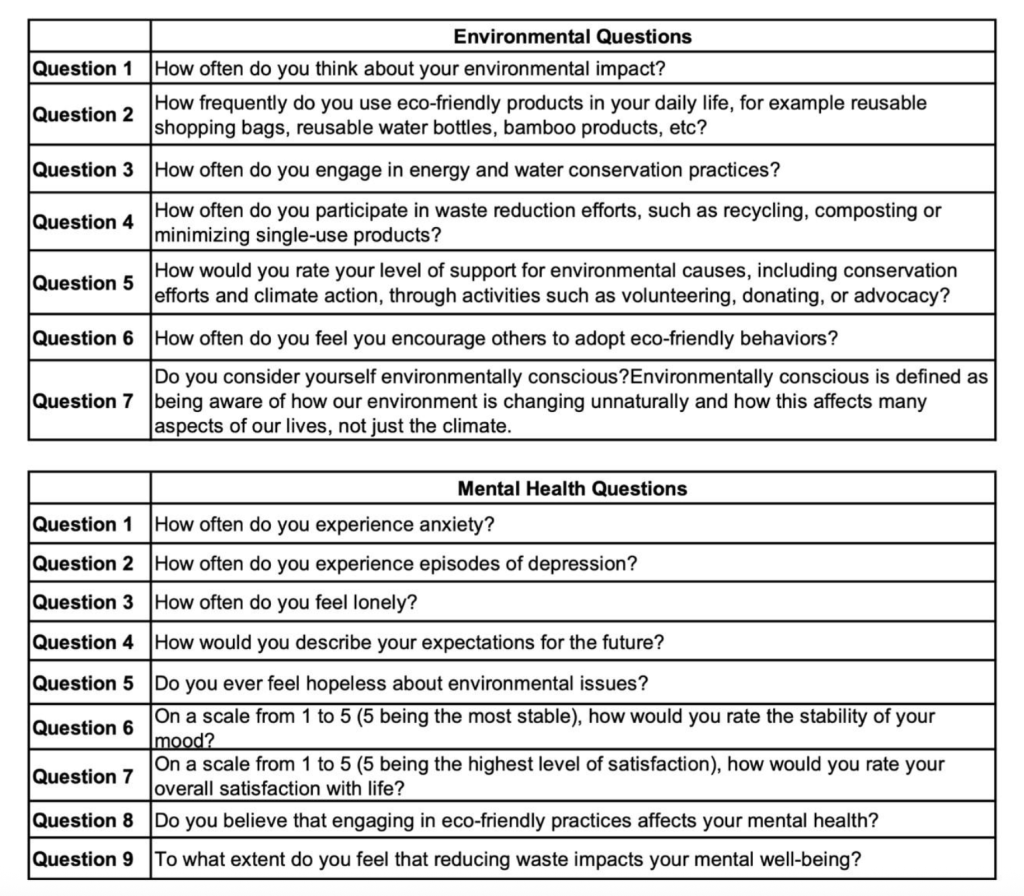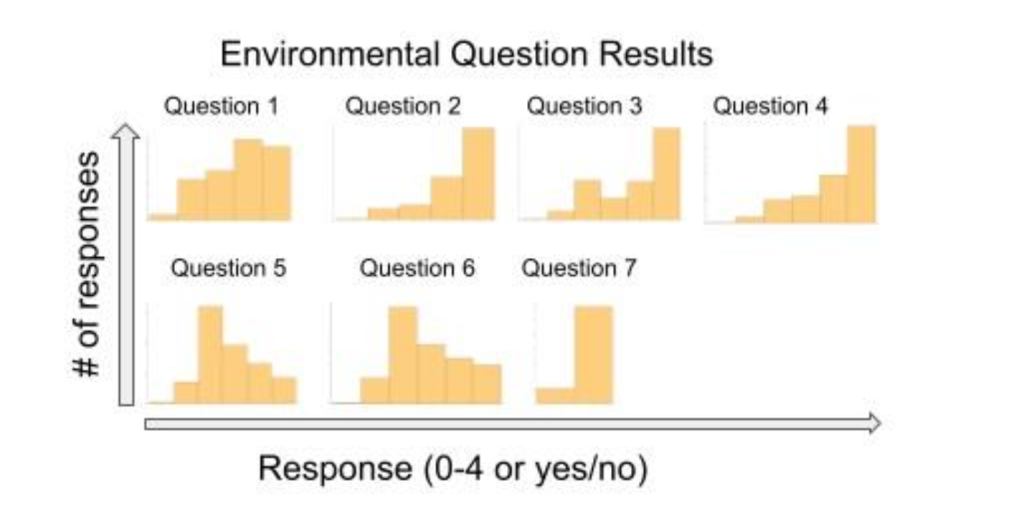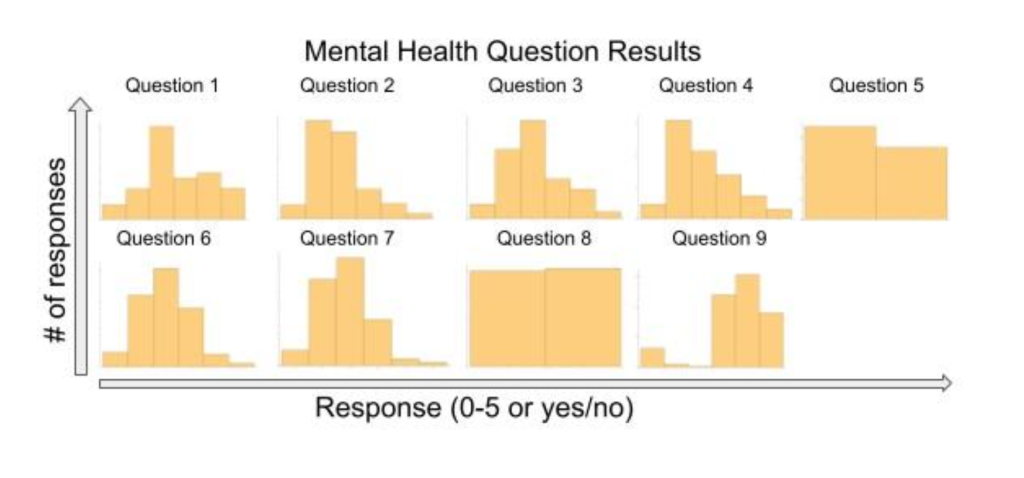
Author: Shloka Chodhari
The Lawrenceville School
Abstract
This research explores the relationship between mental health and environmentally friendly behaviors, specifically among individuals engaging in zero-waste practices. The research question asks, “What is the relationship between mental health and environmentally friendly choices in zero- waste practices?” To investigate this, a survey was conducted with 409 participants from Plainsboro, New Jersey. The survey examined both mental health and environmental consciousness, using multiple-choice questions. The survey consisted of a series of mental health questions, followed by a series of environmental choice and lifestyle questions. These questions were then analyzed to identify correlations between mental health questions, and environmental choice and lifestyle questions. Statistical analysis of the results, including Pearson’s Correlation Coefficients (PCC), revealed no strong or significant correlation between mental well-being and environmentally sustainable behavior. The findings suggest that improved mental health alone may not be a major driver for adopting zero-waste practices. Other factors, such as social, cultural, and economic influences, likely play a larger role in motivating individuals to engage in environmentally friendly behaviors. These results challenge assumptions that better mental health automatically leads to more sustainable choices, and vice versa, highlighting the complexity of factors that influence eco-conscious actions. Further research could explore how educational campaigns on environmental sustainability and mental health, along with social and economic factors influencing behavior change, may link these aspects across different populations, and whether targeted interventions could foster both mental health and eco-friendly behaviors.
Introduction
The growing concern over climate change and the environmental crisis has led to a surge in sustainable living practices, including zero-waste lifestyles. These efforts to reduce waste and minimize environmental impact have become critical in addressing the future of sustainability. As more people adopt these eco-conscious behaviors, a key question remains: How does mental health influence our engagement with sustainable actions? The crossover between mental wellbeing and environmentally friendly choices is a comparison that has not been widely explored. This gap in research motivated me to investigate the potential relationship between the two, particularly in the context of zero-waste practices under the wide category of sustainability. Understanding this connection is vital as it could reveal how mental health influences sustainable behaviors, potentially informing interventions that could either support both individual well-being and collective environmental goals. By examining these factors together, we could also pronounce strategies that promote more effective and lasting behavior change for a healthier planet. Given the growing importance of mental health and sustainability over the past few years exploring this correlation could lead to new insights into holistic well-being and sustainable living.
There are a few existing studies that have explored how mindfulness and mental health can influence a person’s relationship with the environment. For instance, research has shown that individuals who practice mindfulness or have strong mental health are often more connected to their communities and the planet, which can motivate sustainable behaviors (Fletcher, 2024; Jarvis, 2024). These studies positively impacted on my curiosity, as I have personally observed that people with positive mental health tend to be more engaged in sustainable actions and demonstrate a greater sense of responsibility toward the environment. For example, the study by Fletcher links climate change awareness to increased climate anxiety, highlighting how mindfulness activities can reduce anxiety and foster resilience. This differs slightly from the work presented here, which looks at environmental actions (e.g., recycling, activism) and their potential positive effects on mental health, while the first study focuses on the psychological impact of climate change awareness and anxiety. Another study (Jarvis, 2024) examines how mental health challenges (e.g., depression, anxiety) can prevent individuals from engaging in zero waste behaviors, emphasizing how mental well-being often takes priority over eco-friendly actions. While this study focuses on how mental health prevents sustainable actions, my study explores whether environmental behaviors can improve mental health, addressing a gap not explored in this study. My study focuses on the impact ofenvironmental actions on mental health, while the first two studies primarily address awareness or mental health barriers to sustainability. Also to investigate the results we used statistical analysis to test correlations, while the others rely on narrative or general observations.
In light of this, my research aims to explore the relationship between mental health and environmentally friendly choices, specifically among individuals practicing zero-waste living. I hypothesized that higher levels of mental well-being are positively correlated with increased engagement in sustainable behaviors. Individuals with better mental health may feel more connected to both their community and the planet, therefore driving them to make eco-friendly choices. This research is important because understanding this connection could help tailor strategies to promote sustainability by addressing mental health or increasing community connection, encouraging more individuals to engage in environmentally conscious behaviors. With this research, I hope to contribute to a deeper understanding of how mental health and sustainability interact, shedding light on ways to integrate both environmental advocacy and mental health support in future initiatives. Given these results, further investigations could explore other avenues that might have influenced zero-waste practices, such as educational campaigns that address environmental sustainability and mental health well-being separately. Approaches that focus on the social and economic influences of behavior change. Additionally, future research might consider how environmental consciousness, and mental health could be linked in different subgroups or populations and weather interventions targeting specific groups of individuals might help to create both mental health and eco-friendly behaviors.
Results
Survey Design and Results
Surveys were designed to ask a series of questions relating mental health and environmental action (Figure 1 and see Methods). Surveys were distributed via school email to all students, and to local communities’ members via email and text message. In total, 409 responses were received. Demographic data on age, gender, and annual household chores was collected. Most participants were between 10 and 18 years old (44.96%), the median household income was over $200-300,000 per year, and the gender distribution was 35.23% male, 60.28% female, 1.08% non-binary, and 2.73% preferred not to answer. For the PCCs where a P-value was obtained, all correlations were very close to 0, with most being very weakly positive. This indicates that there is no discernible correlation between actions taken towards the environment and mental health. The highest PCC questions were Environmental Question 5 and Mental Health Question 9, and Environmental Question 6 and Mental Health
Question 6, which both had a PCC of 0.25 — a weakly positive correlation. Environmental Questions 5 and 6 are both action-related, while Mental Health Questions 8 and 9 reflect how environmental action relates to improved mental health. Thus, I identify a weakly positive correlation between individual environmental action and improved mental health towards environmental issues.
Survey Analysis
Surveys results are reported in Figure 2. were analyzed used Mathematica to determined Pearson Correlation Coefficients between environmental and mental health questions. Statistically significant correlations are reported in Figure 3. While several of the correlations were weakly positive, a significant number of the Pearson’s Correlation Coefficients were either negative or very close to zero, suggesting no substantial relationship between environmental actions and mental health in these cases.
Negative Correlations:
Environmental Question 1 and Mental Health Question 3 have a correlation of -0.1. This represents a very weak negative correlation, indicating that as engagement in the environment-related behavior described in Question 1 (which could relate to general awareness or concern about environmental issues) increases, there is a slight decrease in the corresponding mental health score on Question 3 (which could be related to anxiety or stress). The negative value is extremely small, however, suggesting that the correlation is negligible. This could suggest that environmental actions, or lack thereof, do not significantly impact feelings of anxiety in the context of this survey.
Correlations Close to Zero:
Environmental Question 2 and Mental Health Question 5 had a PCC of 0.17. Environmental Question 3 and Mental Health Question 8 had a PCC of 0.17. Environmental Question 4 and Mental Health Question 9 had a PCC of 0.21. Environmental Question 7 and Mental Health Question 9 had a PCC of 0.12. These correlations are very weakly positive but close to zero, indicating that there is almost no meaningful relationship between the corresponding environmental behaviors and mental health responses. Such weak correlations suggest that either environmental actions are not having a noticeable impact on mental health, or that other factors (not captured by this survey) might be more influential in shaping an individual’s mental well-being.
Weak Positive Correlations:
Environmental Question 5 and Mental Health Question 8 had a PCC of 0.21. Environmental Question 6 and Mental Health Question 5 had a PCC of 0.2. These weakly positive correlations may suggest that, in certain instances, individuals who engage more with certain environmental actions report slightly better mental health, or at least less mental instability towards environmental issues. However, the magnitude of these correlations is still very small, and the results indicate that environmental actions are not necessarily a strong driver of improved mental health in this sample.
Overall, these results indicate that there is either no discernible correlation, or a weakly positive correlation, between actions taken towards the environment and mental health. The data suggests that while small associations between specific environmental behaviors and improved mental health may exist, they are weak and inconsistent across the sample.
Discussion
Overall, we concluded that there was little to no correlation between mental health and environmentally sustainable actions, particularly in zero-waste practices. The weak or nonsignificant correlations suggest that mental health does not strongly drive environmentally conscious behaviors in this context. While mental health may influence behavior in some situations, it appears less relevant when it comes to motivating individuals to adopt environmentally sustainable practices.
One possible reason for the lack of correlation is the limitations of the survey itself. Questions on personal mental health, such as depression, anxiety, and loneliness, may have been inaccurate due to social desirability bias or participants’ reluctance to report mental health struggles. Many individuals may have been hesitant to openly discuss sensitive mental health issues, leading to skewed responses.
Mental health is a complex issue, and simple survey questions may not fully capture how it influences behavior. For example, factors like long-term mental health conditions or subtle emotional struggles might not have been effectively assessed through basic questions. This could explain why mental health responses did not align strongly with actions related to sustainability.
This result suggests that future research could benefit from more comprehensive mental health measures or a larger sample size to obtain a clearer picture of the relationship. Qualitative research, such as interviews, would also be valuable in exploring the deeper motivations behind zero-waste behaviors and understanding the factors that truly drive environmental actions. Our findings imply that other factors, such as environmental awareness, community values, and education, are likely stronger motivators for zero-waste living. Mental health initiatives alone may not be enough to foster significant behavioral change in this area. Future studies could explore these factors in greater detail by using more thorough mental health assessments or expanding the sample size. Additionally, qualitative research through interviews or focus groups could provide more insight into the underlying motivations for engaging in environmentally sustainable practices.
Methods
Design of Survey
To assess the relationship between mental health and participation in low waste lifestyles, or environmentally friendly lifestyles, I employed a survey system in which a series of questions related to both subjects was asked. I compiled seven questions on environmental behavior, and nine questions on mental health. Mental health and environmental questions and answer choices were constructed based on previously described standards for surveys, and questions were constructed in order to assess both mental health, and attitude towards environmental consciousness (Figure 1). Environmental questions were designed to assess different categories of environmental awareness, including topics such as recycling, charity, activism, water conservation, and general disposition (Figure 1).
Key Words
Environmental awareness; sustainability; environmental action; zero waste lifestyles; mental health
References
- Fletcher, Charlie. “Exploring the Link between Sustainability and Mental Health.” Earth.org, 30 June 2023, earth.org/exploring-the-link-between-sustainability-and-mental-health/. Accessed 3 Nov. 2024.
- Jarvis, Krystina. “Mental Health, Intersectionality, and Zero Waste.” A Drop in the Ocean, 12 Dec. 2018, adropintheoceanshop.com/blogs/blog/ mental-health-and-zerowaste?srsltid=AfmBOooTzuE6hs41GM04oi-B_gAvW2hR4nEaJTiEvdIZ x0wUmZPD8Vs_.Accessed 3 Nov. 2024.Figure 1

Figure 1. Environmental questions (top) and mental health questions (bottom) asked to survey participants.


Figure 2: Survey results from 409 individuals surveyed.
A) Survey results for environmental questions. 0= Never, 1= Rarely, 2= Monthly, 3= Weekly, 4= Daily. For question 7, left = yes, right = no.
B) Survey results for mental health questions. 0 represents healthy mental state. 5 represents mental instability towards environmental issues.Figure 3

Figure 3: Pearson Correlations Coefficients for statistically significant correlation. 1=highly correlation, -1 = inversely correlated, 0= no correlation. On
About the author

Shloka Chodhari
Shloka is a junior at The Lawrenceville School (Class of 2026) whose coursework, research, and leadership all center on the intersection of culture, community, and environmental stewardship. As a William Bouton Welles Research Awardee and Leopold Research Scholar, she’s led an original study on mindful sustainability that revealed links between mental health and zero-waste living.
On campus Shloka founded and presides over the Anthropology & Cultural Studies Unit, serves as Science Features Editor for The Lawrenceville Science Reports, and has authored 20-plus articles across school and national youth publications.
